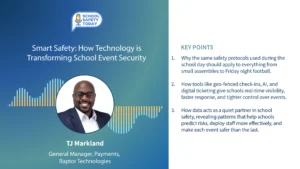COVID-19 Continues its Digital Paradigm Shift in Higher Education
Below is an interview with J.D. White, chief product officer of the newly-formed Anthology, regarding the future of higher-ed technology and how institutions redefine themselves as the higher-ed landscape changes—especially in the wake of COVID-19.
—
What’s your perspective on the state of higher-ed technology?
If you had asked me this question in early January, I would have had a much different answer than today. It’s an interesting time now for higher-ed technology. Pre-COVID-19, I’d have told you that digital transformation was the disruptor that would enable dramatic shifts in the classroom and across the entire institution.
Today’s reality is that the coronavirus itself became the disruptor that forced institutions to think about digital transformation on a scale and compressed timeline that they never imagined. Classrooms that remained essentially unchanged over the last 100 years now look very different. And the conversations we’re having with academic and institutional leaders have changed just as dramatically. Whereas there was some skepticism around the benefits of digital transformation as a disruptor before, now we’re seeing a widespread willingness and eagerness to embrace it. Those institutions that have been slower to adopt technology are recognizing that it will be a critical element of their survival in the COVID age.
What this means is that partners can help institutions realize the power that digital transformation holds. It’s lucky that higher-ed technology was already building to a point where data analysis and digital transformation are much more embedded into the lives of students, leaders and institutional constituencies. The foundation of this work made it possible for institutions to pivot and quickly change perspectives on what technology could help them achieve.
Are there areas within higher education, beyond learning, that have accelerated their use of technology?
Different layers of higher education institutions – from operations to on-campus student activities – have started accelerating digital transformation. Interestingly, they’re doing this by asking new questions of old answers. For example, at the student activities level, clubs and organizations are reconsidering what it means to build communities and engagement so that students feel connected to the institution.
At the University of Kentucky, they started seeing mass adoption of tools used for hosting and managing virtual events. This yielded important data about what students were drawn to in this new environment, especially when compared to previous trends. In the old normal, the institution would have done what they always had, but now they are thinking about how they operate given changing student preferences.
This holds true at the leadership level as well. Campus leaders are asking themselves how to prepare and plan when the situation is so dynamic and how to equip themselves with the information needed to guide that process. What does it mean now to support faculty development and student success at scale, while taking into account the economics of the institution? Now that the dynamics have shifted and the questions have changed so dramatically, institutional leaders are relying on data in ways they hadn’t previously.
Leaders are also realizing that their collective institutional knowledge has been effectively reset. Everyone is at the same level, so what does it really take to be a leader when there are more challenges than solutions, and when all stakeholders have differing pressing needs at the same time?
How should institutions redefine themselves?
The way institutions define themselves and the experiences they provide have been shaken to the core. They’ve had to quickly find new ways to become more flexible, iterative, and integrated in the way they operate and how they analyze and respond to data. There’s an opportunity to scale this change into other aspects of the institution and its extended community, but the institution needs data analytics tools that can provide real-time insights – not reports that quickly become outdated.
There’s also an opportunity for partners to help institutions realize their capabilities as they become more flexible, iterative and integrated in the face of ongoing uncertainty. COVID-19 has thrust institutions into a new future, and it’s too late to step back, so it’s time to examine how we can help empower them with data integration, analytics and workflows.
As an example, the University of Pittsburgh (and others) moved up its academic calendar and adopted an expedited schedule. They’ll need to monitor patterns, assess the experiences of students and faculty, and be responsive. Institutional leaders must be well-positioned to guide and set strategy, as well as to receive and understand feedback. The overall experience on campus will likely be different as the current situation evolves with schedules and courses changing, instruction adaptations as well as general student life.
—
This article also appears on eCampusNews








